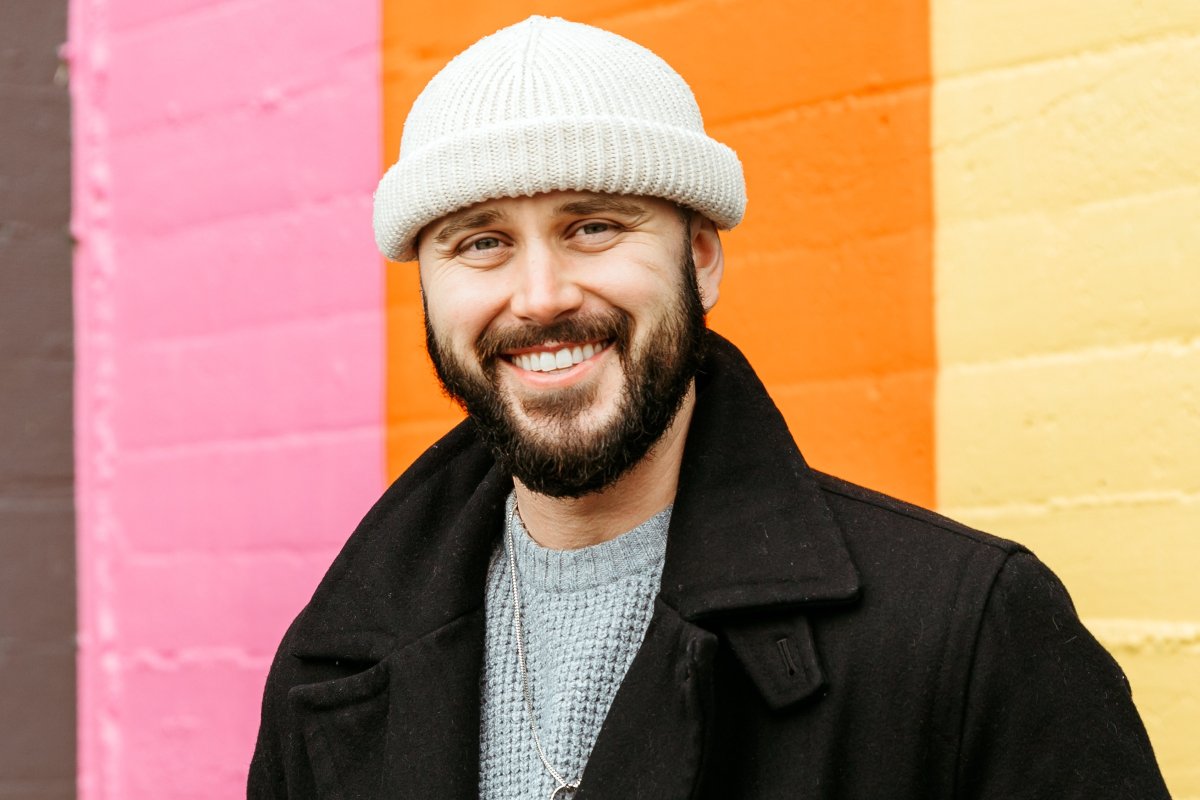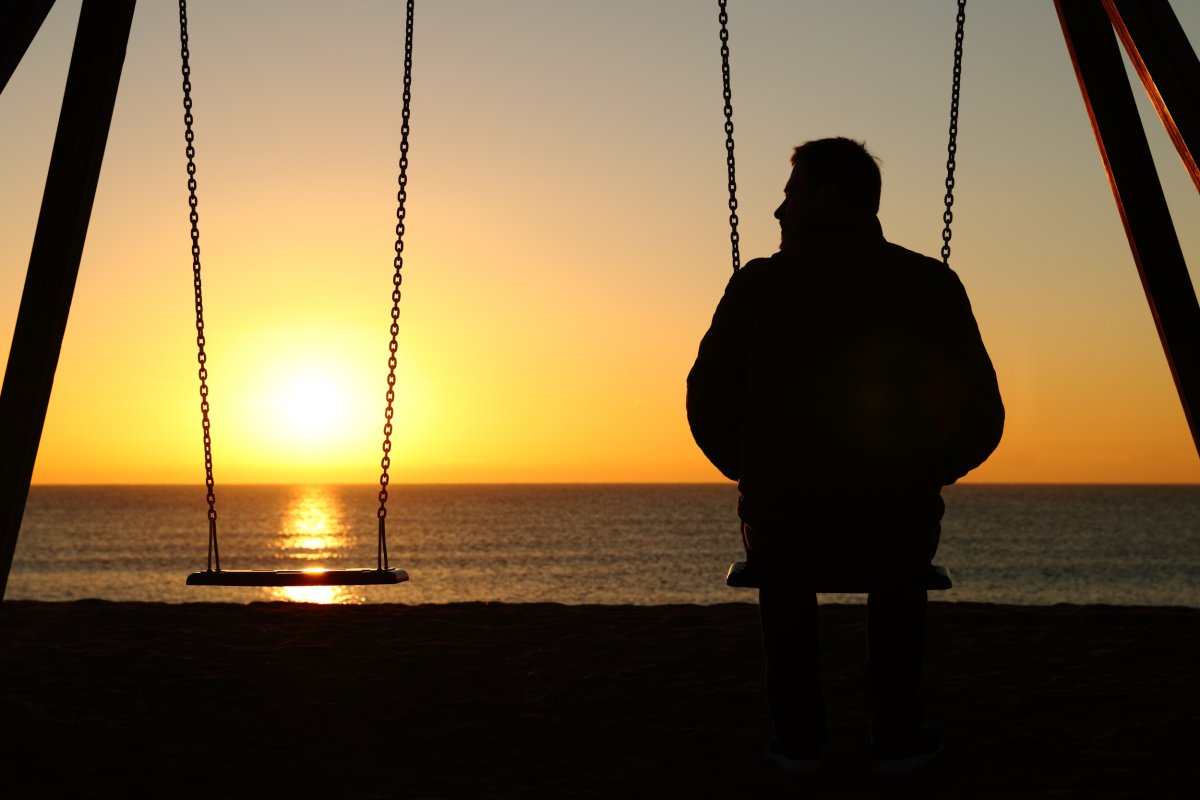Robin Williams, illustrated as a giant blue Genie, had just finished singing to Aladdin about how he had never had a friend like him. I observed intently, desperate to find a Genie who could make me look like the boy I was on the inside. This was one of my first memories of realizing I was transgender. I was eight years old in the 1990s.
As I grew, my life showed cracks in my identity. I had three sisters, and it was painfully evident that one of us was not like the others. When I came out to my mom, she went through her old journals and found one from when I was three. She wrote in it how I seemed to hate being a girl. My life constantly felt like a puzzle that was missing too many pieces.
When I enthusiastically started the transition process at 26 years old, I thought I had prepared for all the significant side effects: Acne, sweating, having an enormous appetite, and everything else that comes from testosterone.
The one thing I didn't prepare for was how lonely it is to be a man.

From childhood to adulthood, I had a combination of friendships with men and women. I was able to talk to anyone without reservation. I had a community of people I could call at any moment, and society felt warm to me, too. I thought the world was open to interactions with most people, as long as you were kind.
Then I started my transition.
It wasn't until my voice dropped and my face changed that I felt the wave of my masculinity. First, my friendships became more distant. A few friends faded away because they'd judged my transition, and many women didn't know how to talk to a guy about our regularly discussed topics.
Men started treating me like their guy friends, which was exactly what I wanted. What I didn't know is that male friendships aren't as deep. Before my transition, guys used to open up to me about all sorts of fears, frustrations, and feelings. Now, they would keep it superficial.
The most depleting were new friendships. It was nearly impossible with women, especially being married, and men. I realized that it would take years to build a semi-deep friendship.
Before transitioning, I didn't receive short pat hugs or shake hands; I got deep, long hugs. I didn't get quick answers about life; I got hour-long conversations. When traveling or running errands, and I saw a parent dealing with an exhausting kid, I could help and not be stared at like a creep.
The way I existed in society was the exact opposite of how I move through it now, and with that comes privilege. I feel safer; I no longer walk around at night clinging to pepper spray. I've had to train myself to move out of women's way before they step aside.
I still get sad at the surprise women have when I move before they do or the joy they get when complimenting their outfits without making it about their bodies. All of the cliche privileges started happening, and if I wasn't holding myself accountable to prevent them, no one else was going to.
And yet, privilege also came with a cost. While I can take up space in most areas, I don't feel like a welcomed and loved part of the community. I started to see my masculinity as the biggest oxymoron. Frankly, it messes with your brain.
As a man, you get to feel safe, but you don't get to be a nurturer or nurtured. You can speak up whenever you want, but not about your emotions, fears, or grief. You have the freedom to do whatever you want whenever you want, as long as that doesn't involve anything feminine, which turns out to be many incredible things, like emotions, intentional parenting, grooming, baking, and so many other activities I've learned are too feminine.
As a trans man, I spent 26 years of my life allowed to feel my feelings, be masculine and feminine, and have deep friendships, which is a blessing and a curse because I knew the depth of life and what it feels like to lose it.
But it also means that I have the tools to navigate this loneliness. What I've come to realize is that most men don't. I believe that's why the suicide rate in men is so much higher. I recently saw that men are four times more likely to commit suicide than women.
We exist in a world where men are told their worth comes after women and children, that they cannot be a caretaker or nurturer without losing their masculinity, and that their sadness is not to be talked about. It's as if we're asking men to despise their lives, and then become shocked when they are violent.
Before I transitioned, I had little empathy for men. And while I still hold us to a high standard, I now see the brokenness. The brokenness of masculinity, how isolating it is, and how men don't know how to break the cycle.
Women often are handed the burden of trying to help men with their lack of emotional understanding, and while I don't think that's the solution, I know that isolating men to figure it out on their own won't give us the outcome we all want.
A few months ago, I made a post about this topic that went viral. I posted a reel about the loneliness of being a man. Some took the angle that I'm not a man because I cried, furthering the stereotype that men are not afforded the luxury of being truly human and crying.
And yet hundreds of men reached out, saying they never had the words to express their loneliness.
For me, thankfully, I took back my masculinity years ago. I define, for myself, what being a man means, including rom-coms, crying, loving Taylor Swift, and asking men about their hardships and emotions.
My friendships dramatically changed when I started leaning into being a whole person again, but it has taken years. Years overcoming my insecurities that I'm not man enough, realizing the trap is that you'll never be manly enough, just like women will never be feminine enough. Years unpacking the ways I was trained to hate feminine things.

As a trans man, I empathize and support women in ways men mostly don't, and as a professional speaker, I've learned communication skills to help me connect with others. I'm working to empower other men with these tools because this lack of emotional understanding, communication, and femininity leads to violence and anger.
If I could advise men, it would be first to look inward. Before reaching out to women for support, understand that this is about your friendship with yourself and how you accept your emotions, fears, and femininity. Whether you journal, go to therapy, or work through it mentally, find a way to be safe in your skin as a whole person. A person who cries, feels joy, and can embrace all aspects of themselves. Read books on healing your emotions, finding ways to communicate your needs, and understanding your feelings.
I cannot stress enough how important it is to learn how to communicate effectively. Communication is one of the greatest gifts society gives women. The allowance to talk to friends for hours about life's highs and lows, tell stories full of vulnerability and cry, and be held by your friends.
I've seen the world through many lenses, and the most profound moments have been with people who fully see and love me; that takes vulnerability and trust. Focus your time on learning how to be vulnerable, build intentional and meaningful friendships, and heal your relationship with what it means to be feminine.
Lastly, for those who are not men, while it is not your responsibility to heal men, I ask you to stretch your idea of masculinity. Hundreds of men reached out to me, saying they try to cry in front of the women in their lives or try to be nurturing, and they remind them to "man up" or that it makes them uncomfortable.
These moments have unimaginable ripple effects. We cannot have a world of healthy, kind, and strong men if we stick to broken stereotypes. I learned as a kid that no Genie will magically come along.
A less violent and aggressive world is possible, and it starts with emotionally healthy men.
James Barnes is a Professional Corporate Speaker and Stress Management Coach. James is a proud father of two incredible kids and married to his best friend, Courtney.
All views expressed in this article are the author's own.
Do you have a unique experience or personal story to share? Email the My Turn team at myturn@newsweek.com
Uncommon Knowledge
Newsweek is committed to challenging conventional wisdom and finding connections in the search for common ground.
Newsweek is committed to challenging conventional wisdom and finding connections in the search for common ground.
About the writer
James Barnes is a Professional Corporate Speaker and Stress Management Coach. James is a proud father of ... Read more
To read how Newsweek uses AI as a newsroom tool, Click here.








